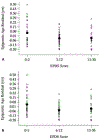Association between maternal prenatal depressive symptoms and offspring epigenetic aging at 3-5 weeks
- PMID: 38479709
- PMCID: PMC11031304
- DOI: 10.1016/j.annepidem.2024.03.001
Association between maternal prenatal depressive symptoms and offspring epigenetic aging at 3-5 weeks
Abstract
Epigenetic clocks are emerging as tools for assessing acceleration and deceleration of biological age during childhood. Maternal depression during pregnancy may affect the biological aging of offspring and related development. In a low-income cohort of mother-child dyads, we investigated the relationship between prenatal maternal depressive symptoms and infant epigenetic age residuals, which represent the deviation (acceleration or deceleration) that exists between predicted biological age and chronological age. The epigenetic age residuals were derived from a pediatric-specific buccal epithelial clock. We hypothesized that maternal depressive symptoms, both sub-clinical and elevated (clinical level), would be associated with estimated biological age deceleration in offspring during early infancy. We analyzed data from 94 mother-child dyads using the Edinburgh Postnatal Depression Scale (EPDS) and DNA methylation derived from offspring buccal cells collected at 3-5 weeks of age. There was a significant non-linear association between the EPDS score and epigenetic age residual (β = -0.017, 95% confidence interval: -0.03,-0.01, P = <0.01). The results indicated that infants of mothers with sub-clinical depressive symptoms had the lowest infant epigenetic age residuals while infants of mothers with no-to-low depressive symptoms had the highest and experienced biological age acceleration. Maternal depressive symptoms may influence the biological aging of offspring living in poverty.
Keywords: Child poverty; Developmental origins of health and disease; Infant epigenetic age; Maternal prenatal depression.
Copyright © 2024 Elsevier Inc. All rights reserved.
Conflict of interest statement
Declaration of Competing Interest The authors declare that they have no known competing financial interests or personal relationships that could have appeared to influence the work reported in this paper.
Figures


Similar articles
-
Placental accelerated aging in antenatal depression.Am J Obstet Gynecol MFM. 2024 Jan;6(1):101237. doi: 10.1016/j.ajogmf.2023.101237. Epub 2023 Nov 25. Am J Obstet Gynecol MFM. 2024. PMID: 38012987 Free PMC article.
-
Maternal Adverse Childhood Experiences and Biological Aging During Pregnancy and in Newborns.JAMA Netw Open. 2024 Aug 1;7(8):e2427063. doi: 10.1001/jamanetworkopen.2024.27063. JAMA Netw Open. 2024. PMID: 39120899 Free PMC article.
-
Maternal depression and adverse neighbourhood conditions during pregnancy are associated with gestational epigenetic age deceleration.Epigenetics. 2022 Dec;17(13):1905-1919. doi: 10.1080/15592294.2022.2090657. Epub 2022 Jun 30. Epigenetics. 2022. PMID: 35770941 Free PMC article.
-
Epigenetic Alterations and Prenatal Maternal Depression.Birth Defects Res. 2017 Jul 17;109(12):888-897. doi: 10.1002/bdr2.1081. Birth Defects Res. 2017. PMID: 28714605 Review.
-
Linking prenatal maternal adversity to developmental outcomes in infants: the role of epigenetic pathways.Dev Psychopathol. 2012 Nov;24(4):1361-76. doi: 10.1017/S0954579412000764. Dev Psychopathol. 2012. PMID: 23062303 Free PMC article. Review.
Cited by
-
Quantification of Epigenetic Aging in Public Health.Annu Rev Public Health. 2025 Apr;46(1):91-110. doi: 10.1146/annurev-publhealth-060222-015657. Epub 2024 Dec 16. Annu Rev Public Health. 2025. PMID: 39681336 Free PMC article. Review.
-
Epigenetic age acceleration and psychosocial stressors in early childhood.Epigenomics. 2025 Jul;17(10):701-710. doi: 10.1080/17501911.2025.2508684. Epub 2025 Jun 2. Epigenomics. 2025. PMID: 40454979 Free PMC article. Review.
References
-
- Ryan CP. “Epigenetic clocks”: Theory and applications in human biology. American Journal of Human Biology. 2021;33(3):e23488. - PubMed
-
- Folger AT, Putnam KT, Putnam FW, et al. Maternal Interpersonal Trauma and Child Social-Emotional Development: An Intergenerational Effect. Paediatric and Perinatal Epidemiology. 2017;31(2):99–107. - PubMed
MeSH terms
Grants and funding
LinkOut - more resources
Full Text Sources
Medical

